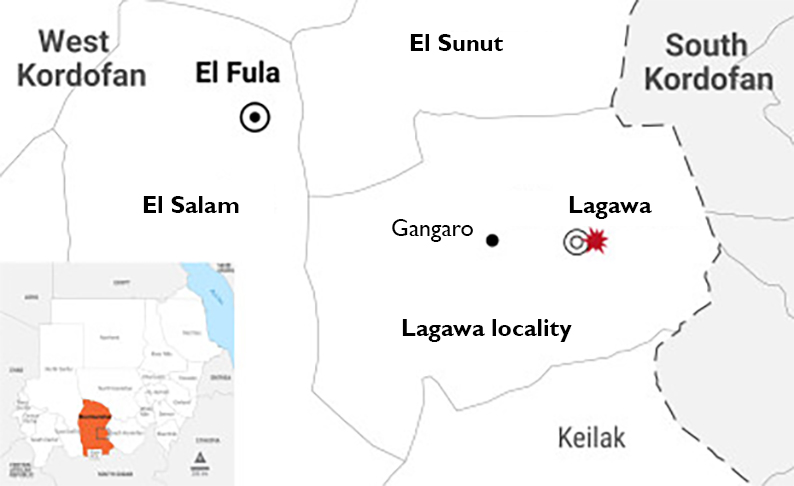Renewed Sudan inter-communal conflict leaves four dead in West Kordofan
Four people were killed in an armed inter-communal clash in the Um Khashmin area of West Kordofan on Friday morning. People from the area told Radio Dabanga that the clashes led to the complete closure of Um Khashmin’s market, which is one of the largest weekly markets in West Kordofan.
 Map showing conflict area in Lagawa locality, West Kordofan (OCHA)
Map showing conflict area in Lagawa locality, West Kordofan (OCHA)
Four people were killed in an armed inter-communal clash in the Um Khashmin area of West Kordofan on Friday morning.
People from the area told Radio Dabanga that the clashes led to the complete closure of Um Khashmin’s market, which is one of the largest weekly markets in West Kordofan. They appealed to the government to expedite the containment of the problem and prevent the renewal of clashes.
In Lagawa, tensions escalated between Misseriya and Nuba tribesmen on October 10 after a land ownership dispute. At least 36,500 people have reportedly fled Lagawa as violence continues. Including the latest figures, the government’s Humanitarian Aid Commission in West Kordofan reports that at least 23 people have been killed and 34 injured during the conflict, OCHA writes.
The hostilities began after a dispute at Gangaro village, approximately three kilometres east east of Lagawa town. On 13 October, Misseriya tribesmen claimed the land, which led to an exchange of gunfire between the Misseriya and Nuba in the market of Lagawa, which continued through 14 and 15 October, Radio Dabanga reported.
Following the inter-communal clashes, the Sudan Armed Forces (SAF) and the Rapid Support Forces (RSF) accused the Sudan People's Liberation Movement-North under the leadership of Abdelaziz El Hilu (SPLM-N El Hilu) of shelling the area. The SPLM-N vigorously denied these accusations.
The area of Lagawa is part of the Nuba Mountains, and used to be part of the Southern Kordofan Province. West Kordofan has importance in terms of natural resources including animals, rain-fed agriculture, and oil fields. Communities in the area still suffer from the lack of basic social services such as health, education and clean water.











 and then
and then